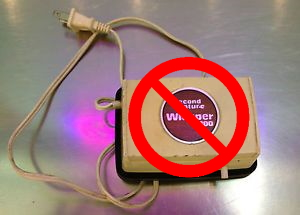
Noisy Aquariums Suck...
Nothings worse than walking into a small, super hot and humid fishstore and being hit with the overwhelming hum of equipment. I use this example because I think it's happened to most of us. Luckily, most of our aquariums or fishrooms for that matter, don't have these problems.
Even still, just one noisy filter on one aquarium can cause someone to be put off by the hobby. It may cause a beginner to think all aquariums and equipment are inherently loud and annoying. Today we will dispel this notion and provide you with a few tips on how to silence your aquariums or fishroom so that its a relaxing space everyone can enjoy.
What's Making All The Noise Around Your Aquarium?
A range off different things can cause an aquarium to be noisy. The two most common reasons are filters and pumps, as well as water splashing noise from the same types of equipment. Fortunate for you, many of these causal agents of noise can be remedied without having to replace them. Let's talk about it!
How To Prevent Equipment Form Making Noise
Here are some quick tips for ways you can quiet your existing fish tank or fish room:
- Using a well built aquarium stand with doors and extra insulation
- Hanging your air pumps
- Making sure no equipment is directly touching and vibration on surfaces
- No water is splashing from filters
- Replacing old or defective pumps and filters
- Checking your filters for snails and debris in the impellors
Tip #1 - Get Rid Of Unnecessary Air Pumps
Air pumps are the number one noise polluter of an aquarium or fishroom. Its common for people with large fishrooms and several tanks to use one central commercial style air pump to run filtration for every tank. This is the most cost effective way to do it, but fortunately it's not something everyone needs to do.
However, some hobbyists do prefer to run air driven sponge filters on many of their tanks. When you have 6 air pumps throughout your small fishroom, you can definitely tell... Add the additional noise from the bubbles breaking at the surface of the water and it can end up being a very loud space.

When it comes to planted aquariums, an air stone is often not something you need to have. If you are using any other type of filtration, adding an air stone to create bubbles is generally not helping the environment or fish in any way. Having a descent amount of plants relative to your water volume will generate more than enough extra oxygen for your fish.
The only time I recommend using air stones is when people have an aquarium with very little or no plants and have a high fish load. This is compounded by high temperatures, typically greater than 80 degrees Fahrenheit. Oxygen is less soluble in water the higher the temperature and with no plants and several fish, particularly big fish, then additional oxygen may be required.
If you have to use an air pump whether its for filtration purposes or adding additional oxygen, here are a few tips to make them less noisy:
- Make sure its a brand name pump with lots of 5 star reviews and customers who have mentioned the noise level in the reviews
- Try covering the additional outputs you are not using if it has them
- Make sure it has rubber feet and is not touching any surfaces
- Try suspending your air pump by hanging it by its cord
- The smaller the pump, the less noise it should make. Make sure your running the smallest one possible for the job
- Don't use an old air pump from the 80's :)
Tip #2 - Raise Your Water Level
Water splashing from filters can create a lot of noise, even on just one aquarium. Some people like the soothing sounds of water running, others are bothered by it. You might be in the first camp and that's great, you have nothing to worry about :) I myself don't mind it, but when it starts to compound I eventually go nuts.

If your water noises are starting to bug you, most of the time this is an easy fix. It's often as simple as raising your water level. Evaporation is inevitable even if you have glass tops, just make sure your staying up on your water changes and this shouldn't be an issue. Sometimes your water level might be as high as you can comfortably have it and still there is some noise.
Most canister filters have an adjustable output, all you have to do in angle it downward to prevent any splashing while still getting water surface agitation. In the case of hang on back filters, it can be more of an issue. This will really require you to keep the water level as high as possible. These filters definitely produce the most noise from the water cascading down it's overflow.
Other types of noisy filters include:
- Trickle filters
- Sumps
These filter are inherently noisy, fortunately they are not as popular in the planted freshwater hobby and hopefully they aren't the source of your issues. You can definitely use some of the tips from this article to help quiet them.
Tip #3 - Invest In High Quality Filters and Pumps
At the end of the day, good name brand equipment that is NEW will always help more than anything. Nothing you can do to make an air pump from the 80's more quiet... Even brand name stuff that is heavily used can easily have problems. Sometimes you might even encounter a piece of equipment that's just slightly defective. It can be tough for a beginner to tell the difference, my rule of thumb is that none of the above tips help the noise then maybe its time to get something new or different. Used equipment is a popular way for people to get into the hobby but these problems may be more common in that scenario, just be aware of that.
Quiet Aquarium Filters
Quiet HOB Filters
That's going to wrap up this article on how to quiet your fishroom and prevent filters and equipment from making too much noise. Don't forget to double check all your pumps both external and internal for obstructions in their impellers and to make sure they aren't vibrating on glass or any other surface :)
Fish Stickers!
$8.00
LIMITED TIME - Get a FREE holographic Cherry shrimp sticker when you purchase the Betta Trio sticker pack!









